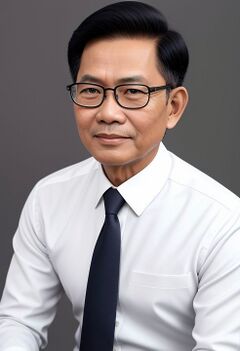Ruben Sasanta
The Honourable Ruben Sasanta | |
|---|---|
 Official portrait, 2009 | |
| Prime Minister of Uskad | |
| In office 9 June 1999 – 9 April 2011 | |
| President | Sumpuna Kumpuni |
| Preceded by | Isaia Kalesono |
| Succeeded by | Talin Jemenak |
| Member of the Uskadian Parliament for Pondok Mandi | |
| In office 7 October 1989 – 2 September 2019 | |
| Preceded by | Yako Hunes |
| Succeeded by | constituency abolished |
| Personal details | |
| Born | April 10, 1958 Sampunuwu, Tanukerta, Uskad |
| Political party | Progressive Workers' Party |
| Children | 2 |
| Profession | Economist |
Ruben Henry Tobias Sasanta SC MSUd (born 10 April 1958) is an Uskadian politician who served as Prime Minister of Uskad from 1999 until his resignation in 2011 and also as Leader of the Progressive Workers Party between 1995 and 2011. He also served as Member of Parliament for Pondok Mandi from 1989 to 2019. His 12-year tenure is the second longest in Uskadian history, behind the country’s founder and inaugural Prime Minister, Robert Susilman.
Gaining the premiership after the PWP won the 1999 general election with a 60 seat majority, his premiership was marked by stable economic growth, liberal social policies and improvement of the welfare system. His government’s foreign policy advocated continued relations with the West, while pursuing reapproachment with Russia and China. Security policies of his tenure were criticised since he passed three controversial Security Acts into Parliament, yet also three major terror attacks occurred under his tenure.
He started his political career by running as MP for Pondok Mandi, defeating CNP incumbent Yako Hunes. In 1993 he was appointed by then-leader Gena Supaka the position Shadow Minister for Manpower and Labour. Supaka resigned in 1995 after being pressured by PWP members dueto the disastrous 1994 general election, where the PWP’s seat share was further reduced to 102 seats. He ran in the 1995 leadership election unopposed, and became Leader of the Opposition.
He led the PWP into a leftward path as he percieved moderating the party by previous leaders has made the PWP lose “the knowledge of what’s best for the working class”. While campaigning for the 1999 general elections, Sasanta promised a stable economy, a strong and secure state and improving working conditions.
After his resignation as Prime Minister, Sasanta returned to the backbenches. He was reelected in 2014. He later stood down as his constituency was abolished in the 2019 general election.
Early life
Sasanta was born in Sampunuwu to mixed Javanese-Native Uskadian parents. His father was a mineworker, while his mother was a nurse. Sasanta was the eldest child in the family, and had two younger siblings.
He grew up in public housing with his parents, while his two other siblings were sent to live with other relatives. His parents later relocated to Panpinangan, to move to the relatively wealthy area of Citabak, after his father had obtained a position at a consultancy firm.
Education
He first attended Citabak State Primary School, where he was known to be quiet and reserved. He was nicknamed Henry by his classmates. He began to be interested in politics at age 12, when he saw then-Prime Minister Robert Susilman doing a speech at his neighbourhood, which inspired him to consider politics.
He attended the National University of Uskad, where he studied Economics. He graduated and started initially as an economist. But after returning to his old neighbourhood one day, he saw the squalid conditions that the residents were living in, and was inspired to run as an MP for the upcoming 1989 general election. He was selected by the local PWP branch to run for Pondok Mandi.
Early political career
He started his political career by running as MP for Pondok Mandi, defeating CNP incumbent Yako Hunes and was one of the few new PWP MPs, due to the CNP maintaining their majority in the election. He began to be outspoken about the working class and provided his own experience as well. He, along with 23 other MPs, became one of the founders of the PWP Democratic Socialists. After consideration by party leader Gena Supaka, he was appointed Shadow Minister for Manpower and Labour. In a famous speech, he questioned then Manpower Minister Leso Gurana’s claim to his dedication to protecting workers and Sasanta highlighted Gurana’s apparent lack of commitment due to his poor handling of the Palangpalolu Mineral Mining disaster.
After the PWP’s poor performance at the 1994 general elections, Sasanta was one of the shadow cabinet members that pressured Supaka into resigning. Supaka later complied and resigned in 1995. Sasanta was unanimously elected as new PWP leader and became the new Leader of the Opposition. Around this time Prime Minister Leteno Sutana resigned and was replaced by relatively unknown cabinet member Isaia Kalesono.
Sasanta used this opportunity to attack Kalesono’s percieved inexperience. He questioned his handling of various issues, and Kalesono’s failure to answer some of his questions led to increased PWP performance in the polls. The PWP’s relative competence in governing the Special Capital Territory was also a factor.
When the 1999 general elections came, the PWP won a landslide victory, with a 60 seat majority.
Prime Minister (1999-2011)
Sasanta became Prime Minister in 9 June 1999, becoming the second Prime Minister to have been born after Uskadian independence. At his first speech as Prime Minister, Sasanta stated that Uskad must thrive in the new millennium, and Uskad has the opportunity to prosper. At his cabinet appointments, he increased the government ministries into 26 ministries and ensured that his cabinet was gender equal.
His first action was to propose the Autonomy Act 1999, which was intended to further the autonomy of Uskadian provinces. It was passed, and some CNP MPs dissented to vote for the Act.